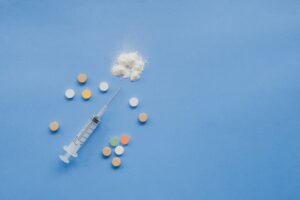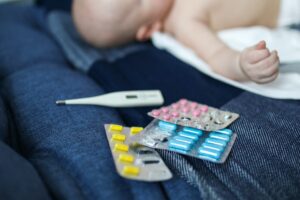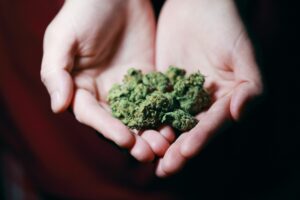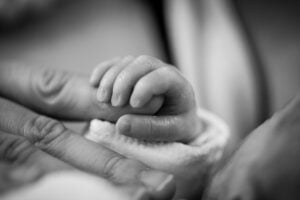- Home
- Addiction Guides
- The Effects of Heroin on Pregnancy
The Effects of Heroin on Pregnancy
Many women throughout the UK become pregnant while addicted to heroin.
Heroin is an incredibly strong substance with extremely adverse health effects for both mother and child.
A BBC report revealed that around 1 in every 500 babies were born physically dependent on illegal or legal drugs in England in 2016.
Some regions were affected more than others. For instance, in Leeds, that figure is around 1 in every 250. (1)
That same year, there were 696,271 live births in England and Wales. This would suggest that around 1,392 babies were born with a dependency -a startling amount. (2)
For those with a heroin addiction, it’s important to understand the effects on parent and child and how to manage the situation most effectively.
Please call our 24-Hour Helpline: 0800 088 66 86.
What is heroin?

Heroin is a highly addictive opiate derived from the poppy seed. It’s a narcotic drug with psychoactive and physical effects. People usually smoke or inject it.
Users often report a high, and it’s also known for pain-relieving effects.
Heroin also causes flushed skin, drowsiness and sedation, heaviness in the body, dry mouth, vomiting, and slowed breathing.
When used, heroin can cause unconsciousness. Where there’s a reduction in oxygen to the brain, it can cause brain damage.
Unconsciousness is mainly due to its depressant effects on the respiratory system.
At its worst, heroin leads to death, and this likelihood is increased when combined with other substances.
Please call our 24-Hour Helpline: 0800 088 66 86.
How does heroin affect a fetus, newborn babies, and pregnancy?

A fetus can be affected by heroin through intrauterine exposure, “in the uterus exposure,” where the fetus is exposed to injury.
When a fetus is exposed to heroin, the following can occur:
- Adverse effects on the placenta mean the fetus can be oxygen and nutrient deprived
- Respiratory distress
- The passing of the baby’s first stool into the uterus
- Impaired cognitive development
- Impaired physical development
- Preterm labour
- Pre-eclampsia causes high blood pressure and possible damage to organs
- Placenta previa can occur where the placenta covers the uterus. Placenta previa can cause heavy bleeding and haemorrhaging.
- Miscarriage
The newly born baby is likely to have developed a dependency. They also might have defects in the eyes, heart, and spine.
In addition, it’s common for there to be weight issues and disturbances around feeding and sleeping.
Newborns of mothers addicted to heroin also have an increased risk of sudden infant death syndrome.
Please call our 24-Hour Helpline: 0800 088 66 86.
Other effects of heroin on a newborn

Those who use heroin are more likely to be involved in risky behaviours.
Including using and sharing needles, having sex without protection and/or with multiple partners.
These risky behaviours also raise the likelihood of the individual contracting STIs and blood-borne viruses.
These can be passed on to the child.
Please call our 24-Hour Helpline: 0800 088 66 86.
Neonatal Abstinence Syndrome (NAS)

Neonatal Abstinence Syndrome (NAS) is neurobehavioral dysregulation.
This means that behavioural signs can appear as the baby is cut off from the opiate after birth. (3) 48-94% of fetuses exposed to heroin experience withdrawal at birth. (4)
This percentage is very high, and the negative consequences are why it’s so important that a mother accesses support from professionals during pregnancy to keep effects to a minimum.
A newborn has various systems of functioning that it uses to self-regulate and instigate particular responses from the caregiver.
In the case of a baby addicted to heroin, these functioning systems are disrupted.
This disruption can result in the following:
- Tremors
- Hyperactive reflexes
- Vomiting and diarrhoea
- High-pitched crying
- Excessive sucking
- Fever and sweating
- Stuffed nose and sneezing
- Irritability
- Poor feeding
- Sleep issues
- Rapid breathing
- Seizures
Please call our 24-Hour Helpline: 0800 088 66 86.
What other substances can cause NAS?

It’s not only heroin that can cause Neonatal Abstinence Syndrome (physical dependency in a newborn). The following substances can also cause this (5):
- Alcohol
- Antidepressants
- Amphetamines
- Barbiturates
- Benzodiazepines
- Cannabis
- Cocaine
- Caffeine (symptoms aren’t as severe)
- Ecstasy
- Methadone and opioids
- Nicotine (symptoms aren’t as extreme)
Please call our 24-Hour Helpline: 0800 088 66 86.
Why going “cold turkey” is dangerous during pregnancy

Many mothers might be desperate to stop using heroin when they find out they’re pregnant. However, anyone with a heroin addiction knows how challenging quitting the substance is.
Unfortunately, there are serious consequences that are more likely for the pregnant person who tries to go “cold turkey”:
- Preterm labour
- Miscarriage
- Stillbirth
If you or someone you love is in this situation, it’s really important to seek medical advice. You can discuss this with drug and alcohol workers and your local GP.
If you’re unsure who your local drug workers and organisations are, call Rehab 4 Addiction for guidance on 0800 088 66 86.
Addiction treatment during pregnancy

For those who enter addiction programmes while pregnant, there are particular treatments provided.
Due to the physical dependency that heroin creates, Subutex, or more likely methadone, will be prescribed to manage withdrawal symptoms.
These medications reduce the risks of blood-borne viruses. They usually come in pill or liquid form. They also reduce the severity of cravings.
These medications are legal and prescribed; a medical team will monitor the doses to ensure the baby is at minimal risk.
There is a chance that the individual could be weaned off prescribed medication during pregnancy if deemed safe by a doctor. However, this is an individualised process; each person is treated as a unique case.
As well as physical treatments, pregnant women will also be encouraged to participate in various therapies.
Cognitive behavioural therapy will be offered, which focuses on changing behaviours through becoming aware of and adapting thought patterns.
Group sessions such as Narcotics Anonymous and SMART recovery are also advisable. These provide excellent spaces to connect to others who are familiar with the issues faced.
The individual rehab centre accessed will also affect the person’s treatment programme.
For example, some might offer counselling, alternative therapies, and support for pregnant mothers.
Please call our 24-Hour Helpline: 0800 088 66 86.
What happens when a newborn is born with NAS/physical dependency?

The main goals of the clinical team at the hospital are; to keep the baby’s temperature normal, support them in building a healthy sleep pattern, reduce hyperactivity, crying, and motor instability, and support the baby to achieve a healthy weight.
The mother will receive specialist support. The team will want to ensure the mother’s good health and guide her towards recovery.
Please call our 24-Hour Helpline: 0800 088 66 86.
Breastfeeding and heroin-dependent mothers

Where possible, UK hospitals support mothers in breastfeeding. This is because breastfeeding creates a bond between mother and child.
However, when a mother is drug dependent, the drive to breastfeed can – in some cases – provide some motivation for the mother to quit heroin.
Mothers who are stable on prescribed methadone are often supported to start breastfeeding, which can also ease withdrawal for the baby.
If a mother wants to stop using methadone while breastfeeding, this must be supported by a midwife or health visitor to ensure the baby’s safety.
However, if the mother is still using heroin, they’ll instead be supported to bottle feed their child. Either way, the mother will be advised on safe breastfeeding practices.
It is important to note that HIV or hepatitis cyC-positive mothers during pregnancy require specialist input.
Please call our 24-Hour Helpline: 0800 088 66 86.
What happens when substance use is treated as a criminal concern while pregnant?

As well as being a health concern, substance use during pregnancy is treated as a criminal concern. Largely dependent on how serious the damaging effects of the substances have on the fetus.
However, this means that many pregnant mothers engage in particular behaviours to avoid getting in trouble. (6)
Behaviours include:
- Isolating themselves
- Missing medical appointments
- Totally disengaging with support
In the UK, mothers are encouraged to engage with social services, the midwife, and health visitors to ensure the health and safety of the child and themselves.
Once the baby is born, professionals aim to keep the mother and child together where this is possible.
Engaging with services and a recovery programme, especially before the birth, supports the family in this area.
Please call our 24-Hour Helpline: 0800 088 66 86.
How to find support if you’re pregnant and use heroin

If you’re pregnant and use heroin, you and your baby will benefit from being supported physically, emotionally, and mentally.
Contacting a team of professionals will ensure you’re both provided with the appropriate care plan needed to monitor health and improve outcomes. (7)
If you or someone you know needs support, call 0800 088 66 86.
Final thoughts

Thousands of babies are born in the UK dependent on a substance every year.
Although more research could be done on heroin dependency in newborns in the UK, much research demonstrates the effects of neonatal abstinence syndrome (NAS).
Heroin exposure in the womb is seriously dangerous. It increases the chances of losing the baby and damaging its health and long-term outcomes.
Pregnant mothers addicted to heroin are supported through recovery programmes throughout the country
. A team of professionals will create a care plan, usually a midwife, health visitor, social worker, and drug worker.
This team of professionals aims to support the mother and child to remain safe and well, usually in the form of a methadone prescription and recovery programme for the mother.
If you’re interested in finding out more about the support available to heroin-dependent pregnant mothers, contact your local GP or Rehab 4 Addiction on 0800 088 66 86.
References
[1] https://www.bbc.co.uk/news/uk-england-36703939
[3] https://www.ncbi.nlm.nih.gov/pmc/articles/PMC7605356/
[4] https://www.ncbi.nlm.nih.gov/pmc/articles/PMC3029977/
[6] https://www.ncbi.nlm.nih.gov/pmc/articles/PMC5151516/
[7] https://www.nhs.uk/medicines/methadone/




